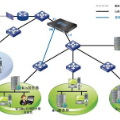As the field of explainable AI (XAI) is maturing, calls for interactive explanations for (the outputs of) AI models are growing, but the state-of-the-art predominantly focuses on static explanations. In this paper, we focus instead on interactive explanations framed as conflict resolution between agents (i.e. AI models and/or humans) by leveraging on computational argumentation. Specifically, we define Argumentative eXchanges (AXs) for dynamically sharing, in multi-agent systems, information harboured in individual agents' quantitative bipolar argumentation frameworks towards resolving conflicts amongst the agents. We then deploy AXs in the XAI setting in which a machine and a human interact about the machine's predictions. We identify and assess several theoretical properties characterising AXs that are suitable for XAI. Finally, we instantiate AXs for XAI by defining various agent behaviours, e.g. capturing counterfactual patterns of reasoning in machines and highlighting the effects of cognitive biases in humans. We show experimentally (in a simulated environment) the comparative advantages of these behaviours in terms of conflict resolution, and show that the strongest argument may not always be the most effective.
翻译:随着可解释人工智能(XAI)领域的发展,要求为人工智能模型(输出)提供交互性解释越来越高,但现有技术主要集中在静态解释方面。本文相反,聚焦于将交互性解释框架化为代理之间(即人工智能模型和/或人类)的冲突解决,利用计算辩论。具体而言,我们将交互式辩论交流(AXs)定义为在多代理系统中动态共享单个代理的量化双极辩证框架中的信息,以解决代理之间的冲突。然后,我们将AXs应用于XAI设置中,其中一台机器和一个人类交互,讨论机器的预测。我们确定并评估了AXs的几个理论性质,这些属性适用于XAI。最后,我们通过定义各种代理行为来将AXs实例化为XAI,例如捕获机器中的反事实推理模式,并突出人类中认知偏差的影响。我们在模拟环境中进行实验,展示了这些行为在冲突解决方面相比之下的优势,并证明最强的论点并不总是最有效的。


